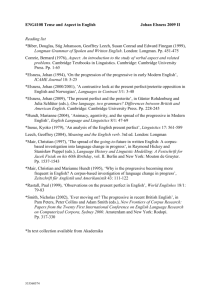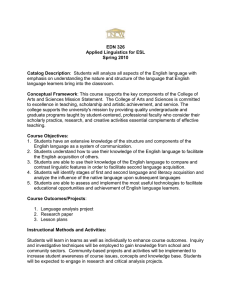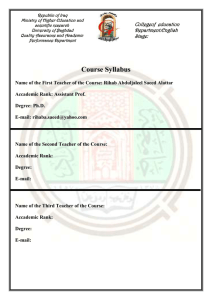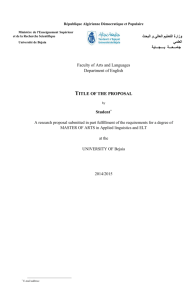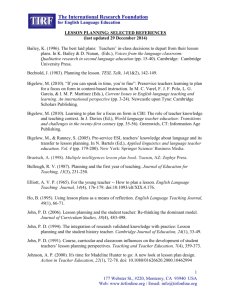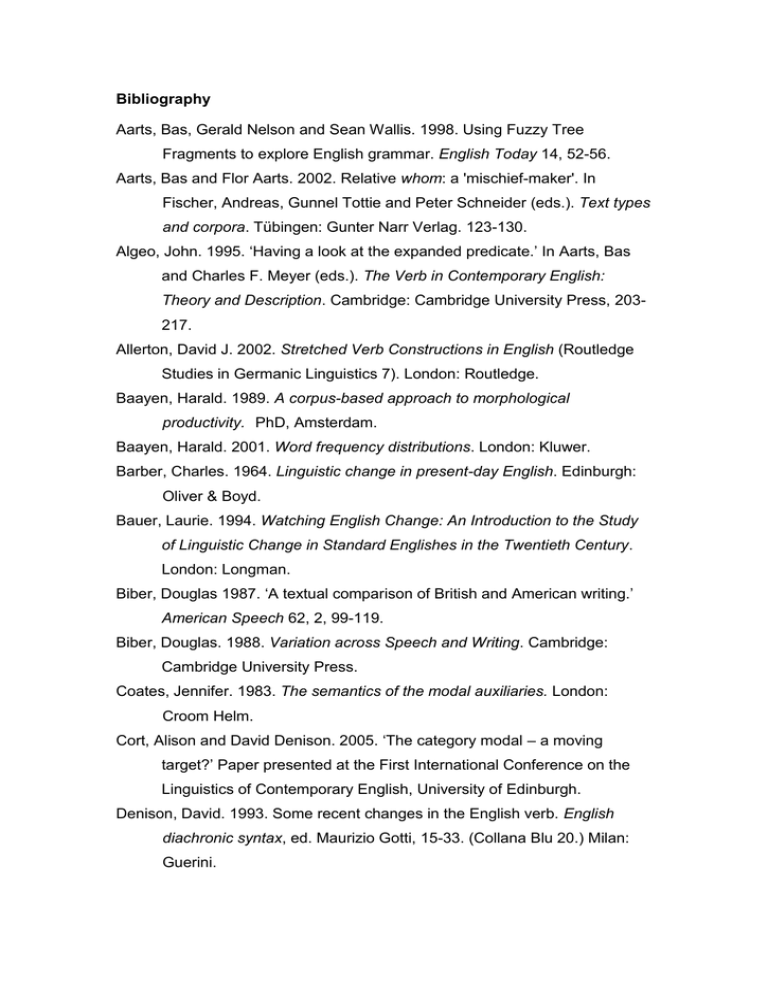
Bibliography
Aarts, Bas, Gerald Nelson and Sean Wallis. 1998. Using Fuzzy Tree
Fragments to explore English grammar. English Today 14, 52-56.
Aarts, Bas and Flor Aarts. 2002. Relative whom: a 'mischief-maker'. In
Fischer, Andreas, Gunnel Tottie and Peter Schneider (eds.). Text types
and corpora. Tübingen: Gunter Narr Verlag. 123-130.
Algeo, John. 1995. ‗Having a look at the expanded predicate.‘ In Aarts, Bas
and Charles F. Meyer (eds.). The Verb in Contemporary English:
Theory and Description. Cambridge: Cambridge University Press, 203217.
Allerton, David J. 2002. Stretched Verb Constructions in English (Routledge
Studies in Germanic Linguistics 7). London: Routledge.
Baayen, Harald. 1989. A corpus-based approach to morphological
productivity. PhD, Amsterdam.
Baayen, Harald. 2001. Word frequency distributions. London: Kluwer.
Barber, Charles. 1964. Linguistic change in present-day English. Edinburgh:
Oliver & Boyd.
Bauer, Laurie. 1994. Watching English Change: An Introduction to the Study
of Linguistic Change in Standard Englishes in the Twentieth Century.
London: Longman.
Biber, Douglas 1987. ‗A textual comparison of British and American writing.‘
American Speech 62, 2, 99-119.
Biber, Douglas. 1988. Variation across Speech and Writing. Cambridge:
Cambridge University Press.
Coates, Jennifer. 1983. The semantics of the modal auxiliaries. London:
Croom Helm.
Cort, Alison and David Denison. 2005. ‗The category modal – a moving
target?‘ Paper presented at the First International Conference on the
Linguistics of Contemporary English, University of Edinburgh.
Denison, David. 1993. Some recent changes in the English verb. English
diachronic syntax, ed. Maurizio Gotti, 15-33. (Collana Blu 20.) Milan:
Guerini.
Denison, David. 1998. Syntax. In: Romaine, The Cambridge history of the
English language IV. Cambridge: Cambridge University Press, 92-329.
Denison, David. 2001. Gradience and linguistic change. Historical linguistics
1999: Selected papers from the 14th International Conference on
Historical Linguistics, Vancouver, 9-13 August 1999, ed. Laurel J.
Brinton, 119-144. (Current Issues in Linguistic Theory 215.)
Amsterdam and Philadelphia PA: John Benjamins.
Denison, David. 2004. Do grammars change when they leak? New
perspectives on English historical linguistics: Selected papers from 12
ICEHL, Glasgow, 21-26 August 2002, vol. 1, Syntax and morphology,
ed. Kay, Christian J., Simon Horobin & Jeremy Smith, 15-29. (Current
Issues in Linguistic Theory 251.) Amsterdam: John Benjamins.
Deparaetere, Ilse. & Susan Reed. 2006. Mood and Modality in English. In
Aarts, Bas & April McMahon, The Handbook of English Linguistics.
Oxford: Blackwell. 269-290.
Facchinetti, Roberta, Manfred Krug and Frank Palmer (eds.). 2003. Modality
in Contemporary English. Berlin: Mouton de Gruyter.
Fischer, Olga and Wim van der Wurff. 2006. Syntax. In Hogg, Richard and
David Denison (eds.). A History of the English Language. Cambridge:
Cambridge University Press, 109-198.
Haegeman, Liliane. 1985. ‗The get-passive and Burzio‘s generalization.‘
Lingua 66, 53-77.
Heine, Bernd. 1993. Auxiliaries: Cognitive Forces and Grammaticalization.
New York: Oxford University Press.
Hogg, Richard and David Denison (eds.). 2006. A History of the English
Language. Cambridge: Cambridge University Press.
Hommerberg, Charlotte and Gunnel Tottie. 2007. ‗Try to or try and? Verb
complementation in British and American English.‘ ICAME Journal 31,
45-64.
Hopper, Paul J. & Elizabeth Closs Traugott. 2003. Grammaticalization.
Cambridge textbooks in linguistics. Cambridge: Cambridge University
Press.
Huddleston, Rodney. and Geoffrey Pullum et al. 2002. The Cambridge
grammar of the English language. Cambridge: Cambridge University
Press.
Hundt, Marianne. 1998. It is important that this study (should) be based on the
analysis of parallel corpora: On the use of the mandative subjunctive in
four major varieties of English.‘ In Lindquist, Hans, Staffan Klintborg,
Magnus Levin and Maria Estling (eds.). The Major Varieties of English
(Papers from MAVEN 97). Växjö: Acta Wexionensia, 159-175.
Hundt, Marianne. 2006. ―Curtains like these are selling right in the City of
Chicago for $1.50‖: The mediopassive in American 20th-century
advertising language. In Renouf, Antoinette, and Andrew Kehoe (eds.).
The Changing Face of Corpus Linguistics. Amsterdam: Rodopi, 16383.
Hundt, Marianne, Nadja Nesselhauf and Carolin Biewer (eds.). 2007. Corpus
Linguistics and the Web. Amsterdam: Rodopi.
Jespersen, Otto. 1909-49. A Modern English Grammar on Historical
Principles. Part 4: Syntax, Vol. 3. Part 6: Morphology. London: George
Allen and Unwin/Copenhagen: Munksgaard.
Johansson, Stig and Else Helene Norheim. 1988. ‗The subjunctive in British
and American English.‘ ICAME Journal 12, 27-36.
Krug, Manfred. 1998. Gotta — The tenth central modal in English? Social,
stylistic and regional variation in the British National Corpus as
evidence of ongoing grammaticalization. In Lindquist, Hans, Staffan
Klintborg, Magnus Levin and Maria Estling (eds.). The Major Varieties
of English (Papers from MAVEN 97). Växjö: Acta Wexionensia, 177
191.
Krug, Manfred G. 2000. Emerging English Modals: A Corpus-Based Study of
Grammaticalization. Berlin/New York: Mouton de Gruyter.
Labov, William. 1972. Sociolinguistic patterns. Philadelphia: University of
Pennsylvania Press.
Leech, Geoffrey, and Jennifer Coates. 1980. Semantic indeterminacy and the
modals. In Greenbaum, Sidney, Geoffrey Leech and Jan Svartvik
(eds.) Studies in English linguistics, 79-90. London: Longman.
Leech, Geoffrey. 2000. Diachronic linguistics across a generation gap: from
the 1960s to the 1990s. Paper at the symposium Grammar and Lexis,
London.
Leech, Geoffrey. 2003. Modality on the move: the English modal auxiliaries
1961 - 1992. In: Facchinetti et al., Modality in Contemporary English.
Berlin: Mouton de Gruyter, 223-240.
Leech, Geoffrey. 2004. Meaning and the English Verb. Third edition. Harlow,
England : Pearson/Longman.
Leech, Geoffrey. 2004. Recent grammatical change in English: data
description, theory. In: Aijmer, Karin, & Bengt Altenberg, Advances in
Corpus Linguistics: Papers from the 23rd International Conference on
English Language Research on Computerized Corpora (ICAME 23)
Göteborg 22-26 May 2002, Amsterdam: Rodopi, 61-81.
Leech, Geoffrey and Nicholas Smith. 2006. Recent grammatical change in
written English 1961-1992: some preliminary findings of a comparison
of American with British English. In Renouf, A. and A. Kehoe (eds)
Language and Computers 55. The Changing Face of Corpus
Linguistics, 185-204.
Leech, Geoffrey, Christian Mair, Marianne Hundt and Nicholas Smith
(forthcoming) Change in Contemporary English. Cambridge:
Cambridge University Press.
Mair, Christian. 1995. Changing patterns of complementation and
concomitant grammaticalisation of the verb help in present-day
English. In Aarts, Bas, & Charles F. Meyer (eds.), The verb in
contemporary English. Cambridge: Cambridge University Press, 258
272.
Mair, Christian. 1997. Parallel corpora: a real-time approach to the study of
language change in Progress. In: Ljung, Corpus-based studies in
English. Rodopi. 195-209.
Mair, Christian and Marianne Hundt. 1995. Why is the progressive becoming
more frequent in English? A corpus-based investigation of language
change in progress. Zeitschrift für Anglistik und Amerikanistik 43.2.
111-122.
Mair, Christian and Marianne Hundt.1997. The corpus-based approach to
language change in progress. In: Böker, Uwe, & Hans Sauer (eds.)
Anglistentag 1996 Dresden. Proceedings. Trier: Wissenschaftlicher
Verlag, 71-82.
Mair, Christian. 2002. Three changing patterns of verb complementation in
Late Modern English: A real-time study based on matching text
corpora. English Language and Linguistics 6, 105-131.
Mair, Christian. 2004. Corpus Linguistics and grammaticalization theory:
Statistics, frequencies and beyond. In: Linquist, Hans, and Christian
Mair (eds.). Corpus Approaches to Grammaticalization in English.
Amsterdam: Benjamins, pp. 121-150.
Mair, Christian. 2006b. Twentieth-Century English. History, Variation and
Standardization. Cambridge: Cambridge University Press
Mair, Christian, Marianne Hundt, Geoffrey Leech and Nicholas Smith. 2002.
Short term diachronic shifts in part-of-speech frequencies: A
comparison of the tagged LOB and F-LOB corpora. International
Journal of Corpus Linguistics 7, 2, 245-64.
Mair, Christian and Geoffrey Leech. 2006. Current changes in English syntax.
In Aarts, Bas, & April McMahon, The Handbook of English Linguistics.
Oxford: Blackwell, 318-342.
Mair, Christian (forthcoming 2008) Corpora and the study of recent change.
In Lüdeling, Anke, Merja Kytö & Tony McEnery (eds.) Corpus
linguistics: An international handbook. Berlin: Mouton de Gruyter.
Myhill, John. 1995. Change and continuity in the functions of the American
English modals, Linguistics 33: 157-211.
Nelson, Gerald, Sean Wallis, and Bas Aarts (2002). Exploring natural
language. Rodopi.
Nesselhauf, Nadja. 2007. ‗The spread of the progressive and its ―future‖ use.‘
English Language and Linguistics 11, 1, 191-207.
Övergaard, Gerd. 1995. The Mandative Subjunctive in American and British
English in the 20th Century (Studia Anglistica Upsaliensia 94).
Uppsala: Acta Universitatis Upsaliensis.
Palmer, Frank R. 1979. Modality and the English Modals. London and New
York: Longman.
Palmer, Frank R. 1986. Mood and modality. Cambridge: Cambridge
University Press.
Poplack, Shana and Sali A. Tagliamonte. 2000. The grammaticisation of
going to in (African American) English. Language Variation and
Change. 11, 3, 315-342.
Quirk, Randolph. Sidney Greenbaum, Geoffrey Leech and Jan Svartvik. 1985.
A comprehensive grammar of the English language. London: Longman.
Romaine, Suzanne (ed.). 1998. The Cambridge history of the English
language. Vol. IV: 1776-1997. Cambridge: Cambridge University Press.
Roberts, Ian & Anna Roussou. 2003. Syntactic Change: A Minimalist
Approach to Grammaticalization. Cambridge Studies in Linguistics
100. Cambridge; Cambridge University Press.
Rudanko, Juhani. 2006. ‗Watching English grammar change: A case study on
complement selection in British and American English.‘ English
Language and Linguistics 10, 31-48.
Serpollet, Noëlle. 2001. ‗The mandative subjunctive in British English seems
to be alive and kicking… Is it due to American influence?‘ In Rayson,
Paul, Andrew Wilson, Tony McEnery, Andrew Hardie and Shereen
Khoja (eds.). Proceedings of the Corpus Linguistics 2001 Conference.
Lancaster University: UCREL Technical Papers 13, 531-42.
Smith, Nicholas. 2002. Ever moving on? The progressive in recent British
English. In: Peters et al., New frontiers of corpus research. Rodopi.
317-330.
Smith, Nicholas. 2003a. A quirky progressive? A corpus-based exploration of
the will + be + -ing construction in recent and present day British
English. In: Archer et al., Proceedings of Corpus Linguistics 2003.
UCREL Technical Papers 16. 714-723.
Smith, Nicholas. 2003b. Changes in modals and semi-modals of strong
obligation and epistemic necessity in recent British English. In
Facchinetti, Roberta, Manfred Krug and Frank R. Palmer (eds.)
Modality in contemporary English. Berlin: Mouton de Gruyter. 241-266.
Smith, Nicholas. 2005. A corpus-based investigation of recent change in the
use of the progressive in British English. PhD, Lancaster.
Smith, Nicholas and Geoffrey Leech (2001) Grammatical change in recent
written English, based on the FLOB and LOB corpora. ICAME paper.
Stein, Gabriele and Randolph Quirk. 1991. ‗On having a look in a corpus.‘ In:
Aijmer, Karin, and Bengt Altenberg (eds.). English Corpus Linguistics.
Studies in Honour of Jan Svartvik, 197-203.
Tagliamonte, Sali A. and Alex D'Arcy. 2007. The modals of
obligation/necessity in Canadian perspective. English World-Wide. 28,
1, 47-87.
Tagliamonte, Sali A. and Jennifer Smith. (2006) Layering, competition and a
twist of fate: Deontic modality in dialects of English. Diachronica. 23, 2.
Tagliamonte, Sali A. (2004) Have to, gotta, must: Grammaticalisation,
variation and specialization in English deontic modality. In Lindquist,
Hans and Christian Mair (eds.). Corpus Approaches to
Grammaticalization in English. Amsterdam: Benjamins.
Tagliamonte, Sali A. 2003. Every place has a different toll: Determinants of
grammatical variation in cross-variety perspective. In Rhodenberg,
Günter and Britta Mondorf (eds). Determinants of grammatical variation
in English. Berlin and New York: Mouton de Gruyter. 531-554.
Tagliamonte, Sali A. (2000) The grammaticalisation of the PRESENT PERFECT
in English: Tracks of change and continuity in a linguistic enclave. In
Fischer, Olga, Anette Rosenbach and Dieter Stein (eds.) Pathways of
Change – Grammaticalization in English. Berlin: Mouton de Gruyter,
329-354.
Traugott, Elizabeth Closs. 1989. ‗On the rise of epistemic meanings in
English: An example of subjectification in semantic changes.‘
Language 65,1, 31-55.
Warner, Anthony. 1995. ‗Predicting the progressive passive: Parametric
change within a lexicalist framework.‘ Language 71, 533-557.
Wallis, Sean, and Gerald Nelson. 2000. Exploiting fuzzy tree fragments in the
investigation of parsed corpora. Literary and linguistic computing 15,
3, 339-361.
Wierzbicka, Anna. 1982. ‗Why can you have a drink when you can‘t *have an
eat?‘ Language 58, 753-799.

